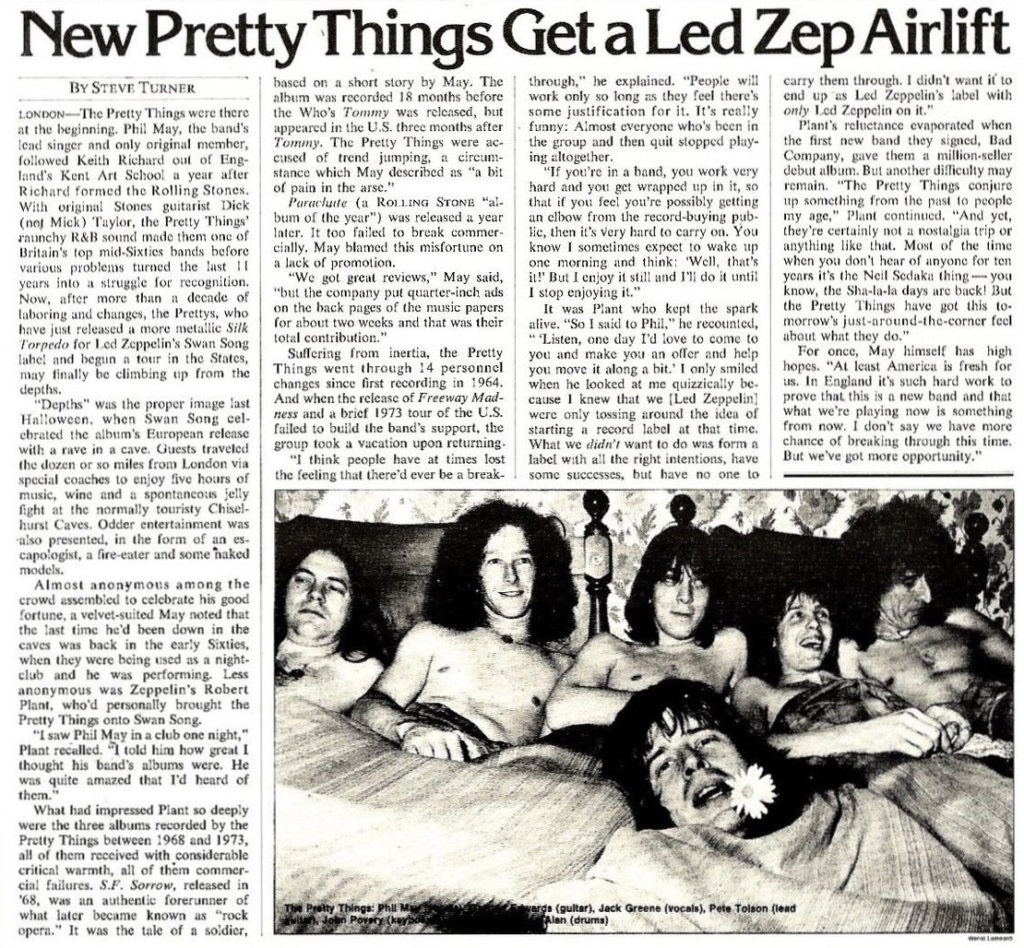Cet article de Steve Turner a paru dans le magazine américain Rolling Stone daté du 10 avril 1975.

Transcription
LONDON—The Pretty Things were there at the beginning. Phil May, the band’s lead singer and only original member, followed Keith Richard out of England’s Kent Art School a year after Richard formed the Rolling Stones. With original Stones guitarist Dick (not Mick) Taylor, the Pretty Things’ raunchy R&B sound made them one of Britain’s top mid-‘60s bands before various problems turned the last eleven years into a struggle for recognition. Now, after more than a decade of laboring and changes, the Prettys, who have just released a more metallic Silk Torpedo for Led Zeppelin’s Swan Song label and begun a tour in the States, may finally be climbing up from the depths.
“Depths” was the proper image last Halloween, when Swan Song celebrated the album’s European release with a rave in a cave. Guests traveled the dozen or so miles from London via special coaches to enjoy five hours of music, wine and a spontaneous jelly fight at the normally touristy Chiselhurst Caves. Odder entertainment was also presented, in the form of an escapologist, a fire-eater and some naked models.
Almost anonymous among the crowd assembled to celebrate his good fortune, a velvet-suited May noted that the last time he’d been down in the caves was back in the early sixties, when they were being used as a nightclub and he was performing. Less anonymous was Zeppelin’s Robert Plant, who’d personally brought the Pretty Things onto Swan Song.
“I saw Phil May in a club one night,” Plant recalled. “I told him how great I thought his band’s albums were. He was quite amazed that I’d heard of them.”
What had impressed Plant so deeply were the three albums recorded by the Pretty Things between 1968 and 1973, all of them received with considerable critical warmth, all of them commercial failures. S.F. Sorrow, released in ’68, was an authentic forerunner of what later became known as “rock opera”. It was the tale of a soldier, based on a short story by May. The album was recorded eighteen months before the Who’s Tommy was released, but appeared in the US three months after Tommy. The Pretty Things were accused of trend-jumping, a circumstance which May described as “a bit of pain in the arse”.
Parachute (a Rolling Stone Album of the Year) was released a year later. It too failed to break commercially. May blamed this misfortune on a lack of promotion.
“We got great reviews,” May said, “but the company put quarter-inch ads on the back pages of the music papers for about two weeks and that was their total contribution.”
Suffering from inertia, the Pretty Things went through fourteen personnel changes since first recording in 1964. And when the release of Freeway Madness and a brief 1973 tour of the US failed to build the band’s support, the group took a vacation upon returning.
“I think people have at times lost the feeling that there’d ever be a breakthrough,” he exclaimed. “People will work only so long as they feel there’s some justification for it. It’s really funny: almost everyone who’s been in the group and then quit stopped playing altogether.
“If you’re in a band, you work very hard and you get wrapped up in it, so that if you feel you’re possibly getting an elbow from the record-buying public, then it’s very hard to carry on. You know I sometimes expect to wake up one morning and think: ‘Well, that’s it!’ But I enjoy it still and I’ll do it until I stop enjoying it.”
It was Plant who kept the spark alive. “So I said to Phil,” he recounted, “‘Listen, one day I’d love to come to you and make you an offer and help you move it along a bit.’ I only smiled when he looked at me quizzically because I knew that we [Led Zeppelin] were only tossing around the idea of starting a record label at that time. What we didn’t want to do was from a label with all the right intentions, have some successes, but have no one to carry them through. I didn’t want it to end up as Led Zeppelin’s label with only Led Zeppelin on it.”
Plant’s reluctance evaporated when the first new band they signed, Bad Company, gave them a million-seller debut album. But another difficulty may remain. “The Pretty Things conjure up something from the past to people my age,” Plant continued. “And yet, they’re certainly not a nostalgia trip or anything like that. Most of the time when you don’t hear of anyone for ten years it’s the Neil Sedaka thing – you know, the Sha-la-la days are back! But the Pretty Things have got this tomorrow’s-just-around-the-corner feel about what they do.”
For once, May himself has high hopes. “At least America is fresh for us. In England it’s such hard work to prove that this is a new band and that what we’re playing now is something from now. I don’t say we have more chance of breaking through this time. But we’ve got more opportunity.”